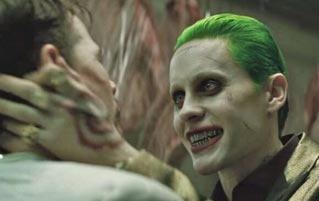Let's Figure Out Why Jared Leto's Joker Didn't Win An Oscar

Joaquin Phoenix won an Oscar last night for his portrayal as the Joker in Joker. Heath Ledger had already done the same with his take on the character in The Dark Knight back in 2009. It's hard to believe there was another cinematic Joker between two Oscar-winning Jokers as recently as 2016 that we've all but forgotten about by 2020. But there was, and now that we've seen that playing the Joker is kind of a cheat code to winning Oscars, we have enough evidence to determine just what kept Jared Leto's Joker from obtaining Oscar immortality.
Regardless of what you think of the movies from which the Oscar-winning Jokers originated, it's undeniable that Ledger and Phoenix's takes felt rooted in a genuine, and successful attempt to craft complex characters from source material that is essentially a children's cartoon. It's like if they made a G.I. Joe movie that was a real meditation on the cruelties we unleash on one another in the name of nationalistic pride (but also the bad guy was a snake man)?

Joaquin's Joker is the product of a society that stopped caring about the people at the bottom. Ledger's is a mythological specter deadset on proving that we're all as bad as he is. He has no beginning and likely no end. Leto's Joker went mad after he was kicked out of the band Crazy Town. Never at any point in Suicide Squad does it seem like there's any kind of philosophy informing the character. The character's reason for existing began and ended with the thought, "But what if the Babadook were a SoundCloud rapper?"
What's most puzzling about it, especially now that we have a wide array of takes on the character to compare to one another spanning every entertainment medium, is how Leto overcomplicated him. Every line delivery feels like he's trying to make the clown man into a deep, complex human because that's how you art. He's just a generic gangster in clown makeup. For as much as some odd, somewhat militant pockets of fandom have deified the character as an icon of disaffected white males, the Joker ultimately isn't that interesting. Again, he's a children's cartoon character. He destroys things because it's funny to him. You can add all sorts of pretentious actorly complexity to him by trying to explain why society made him that way, but the character should still work (and arguably at its best) if you strip all that stuff away and just made him a toddler who laughs at a collapsing Jenga tower.
Leto's Joker was mocked before Suicide Squad ever came out. Seeing it onscreen didn't rehabilitate our cringy first impressions. Considering that audiences have the capacity to accept Jokers of all kinds, from Joaquin Phoenix's Oscar-bait seriousness to Cesar Romero's whimsical silliness, it's funny how we singled out this one version of the character as the definitive take that we can almost universally agree is wrong, or at least a little off. It looked worse compared to what came before it and now it looks even worse compared to what came after it. Leto certainly tried really hard to carve out his own indelible niche in the history of the character. But maybe he tried a little too hard. And we only know that now because neither of the Oscar-winning portrayals of the character felt like they were rebelling against a society that took the caffeine out of Four Loko.
Luis can be found on Twitter and Facebook. Check out his regular contributions to Macaulay Culkin's BunnyEars.com and his "Meditation Minute" segments on the Bunny Ears podcast. And now you can listen to the first episode on Youtube!